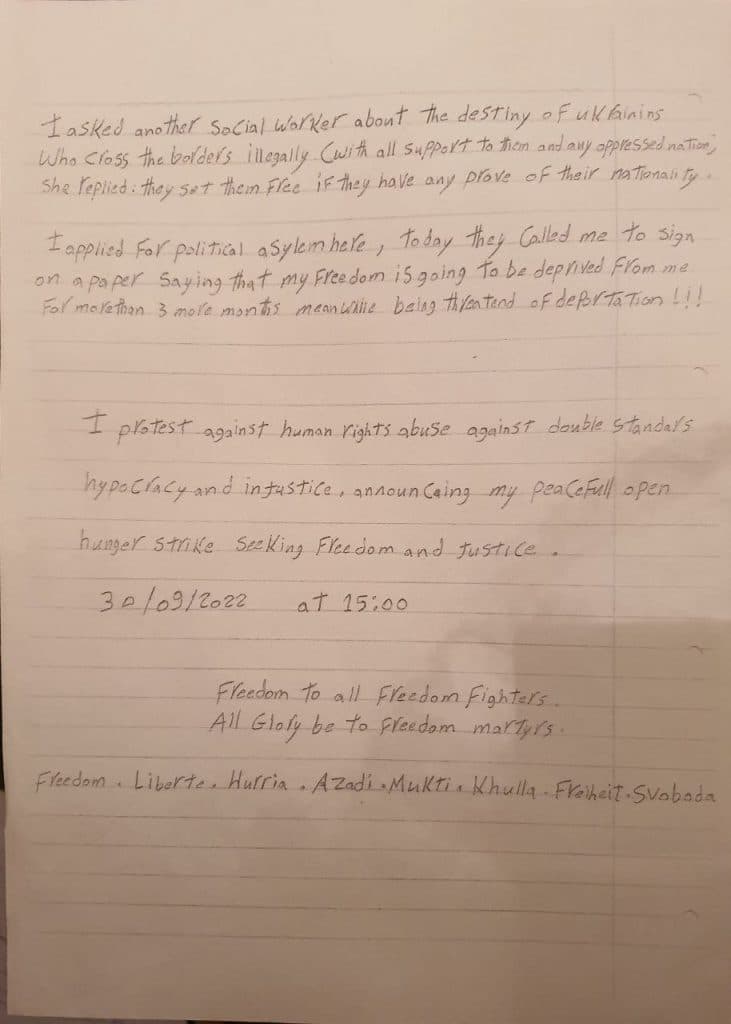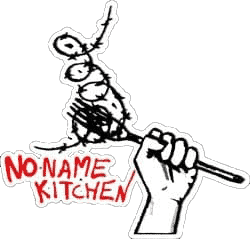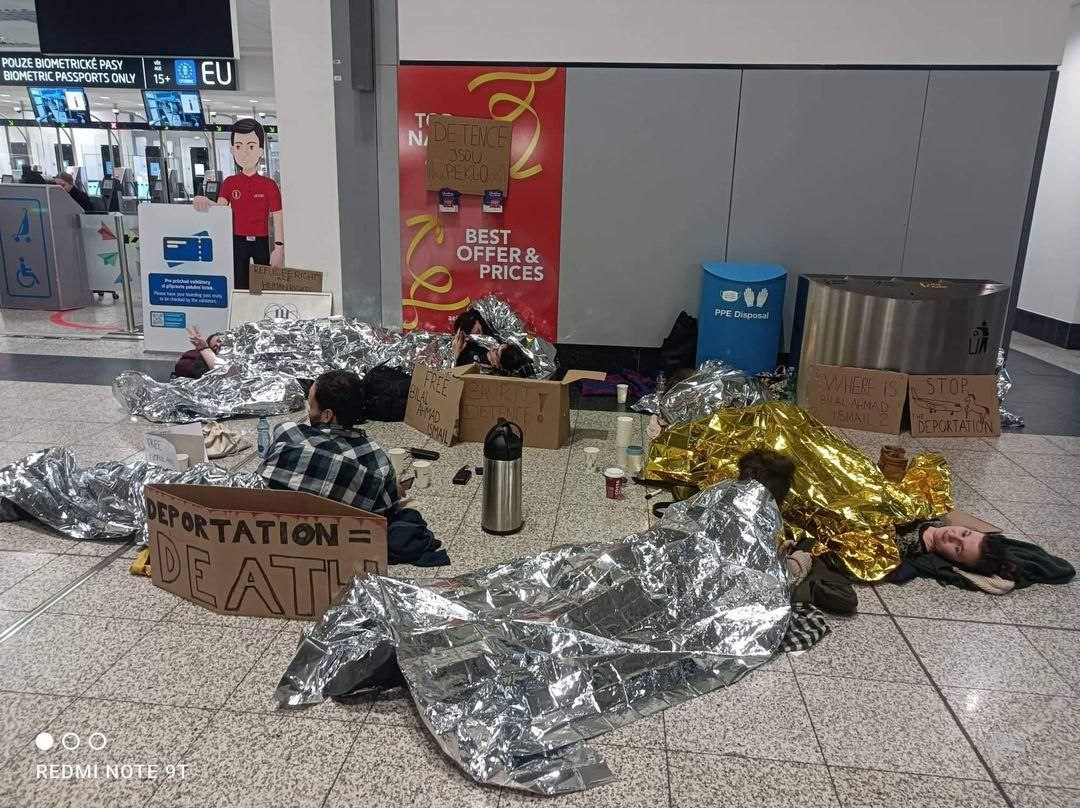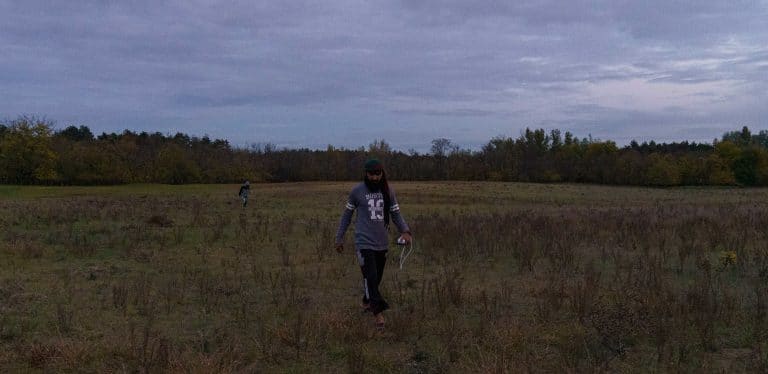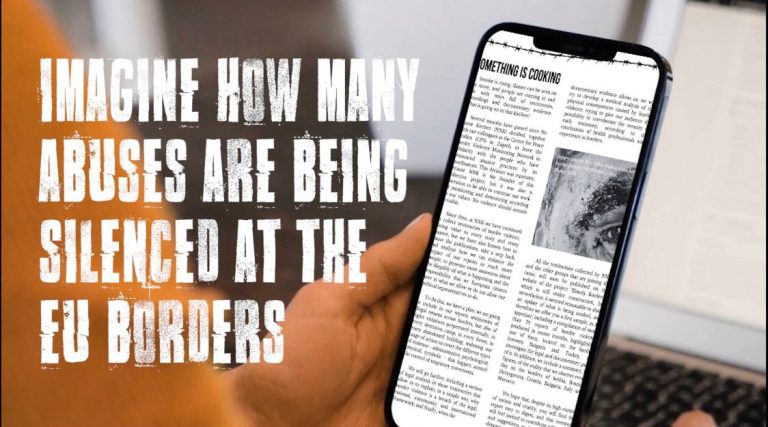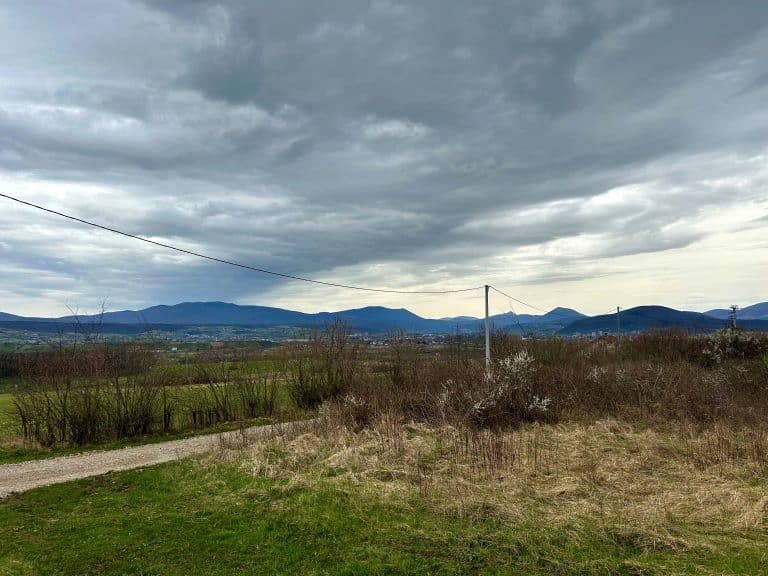By Arianna Egle Ventre & Ahmed Abu Senena
Ahmed doesn’t know where he is. He only knows that until a few hours before he was in Germany, thinking to be finally safe. Instead he is now in a cell, alone, without food and blankets in an unknown facility in the Czech Republic. He doesn’t know what will happen. He doesn’t know that he will be threatened with deportation to Egypt. He does not know that he will soon be transported to Balkova detention centre, where he will spend about a month. It is mid-September 2022 and Ahmed only knows the reason why he is there, in a closed room: because he had no choice but to cross the border irregularly.
And this makes him in the eyes of the Czech authorities a person not even worthy of a blanket or some explanation for being locked up in a cell for two days. “They kept me in the cell for two nights, I was shaking because of the cold. I was knocking on the door asking for a blanket but then three police officers pushed me to the wall telling me “just sleep and wait, don’t shout, don’t talk”. I was hungry, I didn’t eat for three days. But they only answered me by saying something like “You have crossed the border illegally, you are a criminal”.
In the cell, alone, his fundamental rights are not respected. This is not the first time. Along the many borders he has crossed, Ahmed has experienced numerous abuses and violations of basic human rights. Over the years, he has faced danger and uncertainty while searching for a safe place to build his life. He had to leave Egypt because he was in danger as an activist in his own country. He protested in Egypt, he protested in the cell of the unknown facility, he protested in the Balkova centre.
And he is still protesting now, denouncing the abuses he experienced in the Czech Republic and other European countries.
He is currently in a safe place in the EU while his asylum case is being processed. He got in touch with No Name Kitchen in order to tell us his story and highlight the problematic nature of a border system that traumatises and violates human rights even within the EU.
FLEEING EGYPT
It was 2016 when he had left Egypt after being sentenced by a court to 3 years jail for his political activism. Then he fled to Sudan, but after about a year he went to Asia to avoid being repatriated from Sudan to Egypt, where he would be put in prison due to a sentence for his political activism. He spent 3 years searching for stability, but without success. Hence, he decided to go to Turkey and as he explained:
“I spent one year there to apply for a visa in a country which respects all refugee commitments. That was my only hope since my visa was about to expire and I couldn’t go to my embassy. But I got rejected everywhere”.
With his passport about to expire, Ahmed had no choice but to begin his journey across Europe’s external borders without visa. Until he arrived in Serbia in 2022, where he met No Name Kitchen. “I spent 1 month trying to cross the border. I was pushed back by both Romanian and Hungarian police more than 10 times. I was beaten every time and sometimes they broke my mobile. Once I was even sent back to Serbia from Budapest train station despite having told the police that I wanted to apply for asylum” said Ahmed and then continued: “I finally reached the Czech Republic and from there I left for Berlin by bus, but just after 10km from the Czech-German border I was stopped by German police. The officers asked for ID…but I didn’t have”.
RACISM AND ATTACKS TO HIS RIGHTS IN EUROPEAN UNION COUNTRIES
He spent one night in a German police station until he was told by the authorities that he would be returned to the Czech Republic. “In Germany they were explaining to us the situation, they brought a translator and we had a decent conversation with them..it wasn’t bad, maximum they were shouting and they were racist and insulting”. The racist treatment received by German officers seemed nothing to Ahmed compared with the behaviour immediately shown by Czech authorities. A sad competition, in which there are no winners but players of a game who wash their hands of their responsibilities.
“Czech officers were insulting and shouting at us. Because of this first bad impression I asked the German officer who was handing us over why they were talking to us in that intense manner. The answer was “it is a different country. I can’t say anything, I can’t react”.
After that Ahmed and other people on the move were taken to the above mentioned facility, which Ahmed was unable to locate. “There they were inhumanly searching us, it was completely tough the treatment…I never had a conversation with them, they didn’t see us as someone who deserved a conversation.” he told. Thereafter, Ahmed waited hours and hours together with many other people from different countries. They waited for the unknown. The translator didn’t help them, quite the contrary. According to Ahmed, he didn’t just translate, but offended the detained people.
“They forced me to sign so many papers. The translator told me they were about to bring me to jail in order to deport me back to Egypt. I was shouting that I needed another translator, but they told me that they would keep going with or without my consent. They wanted to deport me without even listening to my story, without anything.”
When Ahemd tried to object and to claim the right to a phone call, he only got a refusal and a night in solitary confinement in the mentioned cell. He was confused, scared to be deported. The information was unclear, he didn’t know what to expect. After the time in solitary confinement he was brought to Balkova immigration detention centre under the administration of the Interior Ministry. He immediately perceived on his skin the structural racism within the centre’s management. “Not only the police, but even nurses, social workers, everyone inside the facility had a big amount of hate toward us, we could feel it” he recounted. Only there he could finally get some guidance on how to proceed with an asylum application.
“My intention was to ask for international protection. In the Czech Republic, in Germany, in Mozambique, in Ghana..I don’t care I just wanted to be safe and stable somewhere. If I didn’t apply for asylum I would have been deported 100%. But when they told me that I had to wait 4 months more inside the centre for the interview , I couldn’t believe it”
Waiting, waiting, waiting in a prison. Ahmed described life inside the Balkova centre and it does not seem to have much difference from a prison. Any facility related to migration is managed by the Refugee Facility Administration, an organisation funded by the budget of the Ministry of Interior. According to their description, Balkova detention centre is “primarily used for the detention of foreigners who have been issued a decision on administrative deportation and detention by the foreign police. The clientele consists of persons who, by staying in the territory of the Czech Republic, came into conflict with the laws of the Czech Republic”.
In order to be able to deport, the Czech Republic must have a bilateral agreement with the country of origin (which it rarely has), which is why people of certain nationalities are more likely to be imprisoned in such camps. Closed, limited phone calls, low quality food, lots of hate. Ahmed explained: “It is a closed camp: it’s a jail. They say it’s a camp but it’s a jail. I escaped military fascism in my country and I faced it inside Europe. it is like fascism, my case was not put to any trial or court and they already considered me a criminal. How can I stay four months without any trial? I told them (the authorities) that I would have started 100 strikes for my freedom and I wrote a manifesto about the reason for my protest.”
A HUNGER STRIKE
According to Ahmed the people inside the centre are not supported by lawyers and do not receive sufficiently clear information, so that every choice and event seems to be left to chance or to the will of the centre authorities, as he said: “Normally you go to court and they decide that you have to stay there for a specific amount of time, but there the only authority entitled for our detention is the police, which can arbitrarily extend. I remember two brothers, one was released and one is still there just because the police wanted that: zero justice” With the aim of having his case analysed by a court for this purpose, he started a hunger strike. He explained and wrote his own reasons for the strike. He wrote a long paper, ending:
“I protest against human rights abuse, against double standard , hypocrisy and injustice, announcing my peaceful open hunger strike seeking freedom and justice”
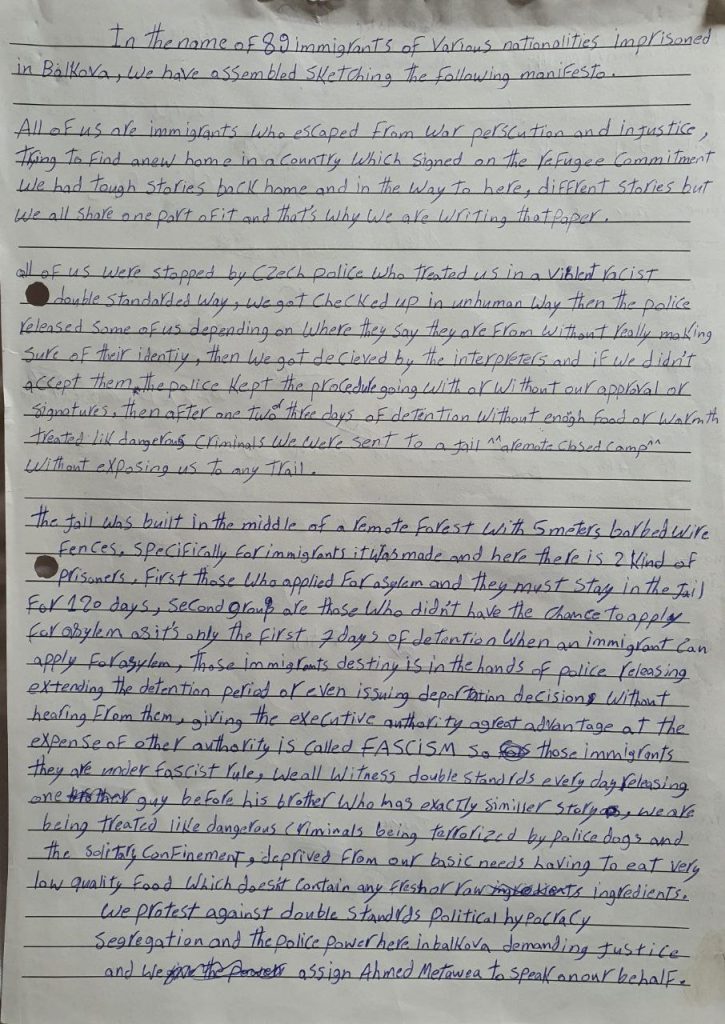
After a week, he lost consciousness. But he didn’t lose his determination to obtain his rights: “One day they told an Egyptian guy to sign some papers allegedly for his release and then after he signed they told him “that’s your release to Cairo” and they tried to deport him. After we gathered there we wrote the manifesto”. The protests attract media attention, thanks also to the help of some friends with whom Ahmed manages to get in touch.
“The hunger strike, the protest and the manifesto were covered by the media. A representative from a refugee commission came to Balkova centre. After that, the treatment was a little bit better, but… the problem is on a big scale, it is up to the institutions and the politic in Czech Republic: very disrespectful for migrants”
After attracting attention, Ahmed is presented with the possibility of withdrawing his asylum claim in order to leave the detention camp: he is finally released. But not before paying the required fee for his residence in Balkova. He shows the receipt through the video call screen. 550 euro. “We have not only faced an overall xenophobia and racism from police, we are even paying for it” he claimed. However, he finally has the opportunity to leave the Czech Republic: now he is safe in a European country while he waits for an answer to his political asylum. But back comes the anger and indignation at the injustices he has suffered along the way. He is determined while telling his story, but worried about the people still locked up in the centre and the others who will be. In recent months, the migration issue has come more strongly into the centre of the country’s political debate. Border controls with Slovakia were set up in September 2022 (even if it is a border inside the Schengen area) and further intensified over the last month. Moreover in October 2022 the Czech Presidency of the Council called for an urgent need to increase deportations.
Ahmed reiterates several times the strength of collective protest, the only way to bring out the injustice experienced by many. We read in the photo of the poster he sent us:
“All of us are immigrants who escaped from war, persecution and injustice, trying to find a new home in a country which signed all the refugee commitments. We had tough stories back home and in the way to here, different stories but we all share one part of it and that’s why we are writing this paper.”
